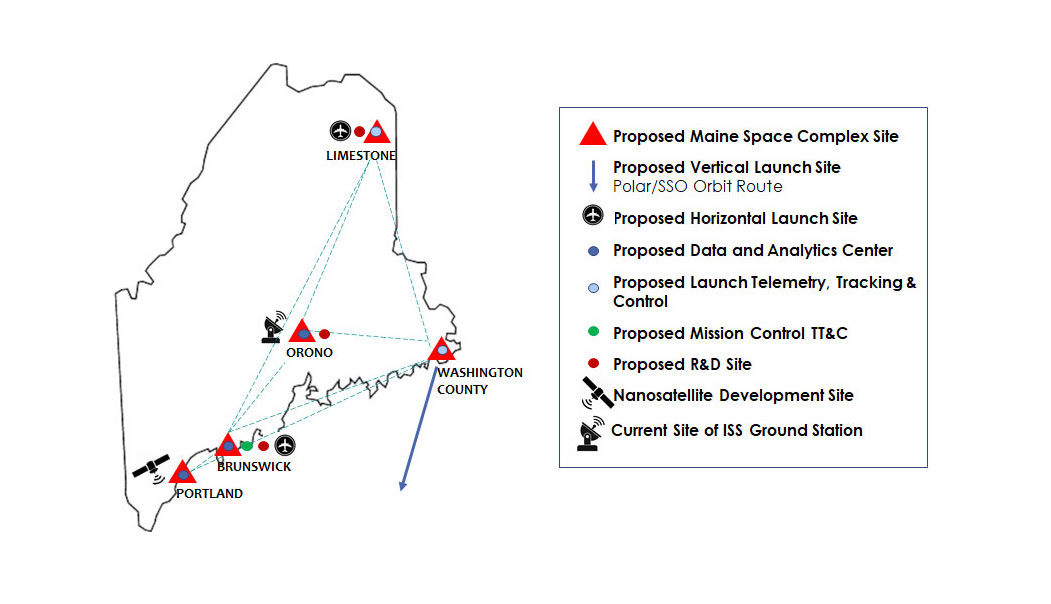Maine Space Complex
The Maine Space Complex will be geographically distributed, benefiting multiple counties throughout the State, as shown in Figure 1. Geographically distributed capabilities offer the best opportunity to align with the market demand and facilitate the growth of Maine space offerings.

Maine Space Data & Advanced Analytics Center.
The Space Data & Advanced Analytics Center will be a cloud-based, digital platform resourced to import/downlink, store, cleanse, manage, and analyze satellite data in concert with terrestrial data to solve local business public policy issues in innovative ways. This will be a distributed network of nodes, offering portals from various locations (ex. Roux Institute, University of Maine, Governor’s Office, etc.) to access satellite data (and other relevant data sets) for data science applications such as machine learning and artificial intelligence. It will be resourced with human capital that can specialize in satellite data and advanced analytics to drive the application of data toward the advancement of local industry and policy use cases and provide support and mentorship to data-centric startups and companies. It will require a cloud configuration with a network equipped with the hardware and software to import/downlink, store, cleanse, manage, and analyze satellite data in concert with terrestrial data to solve business and public issues in innovative ways and support the development of data-focused startups creating new data products and services.
Maine New Space Innovation Hub.
To be located at Brunswick Landing, with a spoke at Loring Commerce Centre, the Hub is envisioned as a knowledge and innovation hub for new business incubation and acceleration, hardware and materials component development facilities, and satellite and launch vehicle manufacturing and testing. The shared space will contain specialized equipment to facilitate R&D, academic and scientific inquiry. It will also house joint academic-industry research initiatives, an office of tech transfer, administrative office space for businesses, and conference facilities to host national/international events to draw users and attention to the Maine space industry. It will also act as an educational center providing classrooms for in-person and remote K-12 and higher education learning opportunities and events.
Maine Launch Sites & Services.
This unit will include both vertical launches at one or more sites along the coast of Maine, as well as horizontal launch capabilities from aircrafts that leverage the long runways at Brunswick Landing and Loring Commerce Centre. Both launch venues will be low-cost and provide accessibility to low earth orbit polar orbit launch sites for small satellites with superior customer service to serve the commercial, academic/scientific, and government sectors. The sites will create a need for credentialed and highly skilled technical jobs and offer workforce retraining opportunities. Launch capabilities will spur the development of a knowledge cluster, creating a foothold to capture prospects as the industry matures and develops. The sites will also leverage Maine’s current rocketry, data, and geospatial analytics capabilities to become a more visible national and international aerospace industry destination.
Contribution to Maine’s Economic Development Strategy 2020-2029
The Maine Space Complex will contribute to the state’s Economic Development Strategy 2020-2029 TALENT and INNOVATION Goals by:
- Retaining Maine’s students and Immigrants with STEM degrees.
- Attracting highly skilled workers and their families from out of state.
- Encouraging startups and spur development in all seven technology sectors.
- Developing globally based applications for research, commercial and consumer uses.
- Facilitating STEM learning opportunities for Maine high school and higher education students.
- Promoting economic aspirations for All Mainers.
- Advancing Maine to a new competitive level in a fast-growing Knowledge Economy.
Economic Impact Projections
The Maine Space Grant Consortium (MSGC) commissioned the Center for Business and Economic Research (CBER) at the University of Southern Maine (USM) to conduct an economic impact analysis of the proposed Maine Space Complex and business components. The study developed revenue and market share forecasts for space complex business components drawing on several industry sources and experts. Four scenarios were simulated over an 18-year forecast horizon using an economic model developed by Regional Economic Models Incorporated (REMI) and maintained by CBER. The results indicate that a new space economy in Maine could contribute:
- Between $550 million to $1.1 billion per year (in fixed 2022 $) to the state GDP by 2042, and
- Between 2,800 and 5,500 good-paying jobs annually by 2042 while providing a significant source of tax revenues across the state.
Although not a comprehensive evaluation of a space complex development, these simulations represent the potential impacts assuming that a new space economy emerges in line with market forecasts and under the various scenarios simulated in this analysis. There are no probabilities assigned to these scenarios.
The development of the Maine Space Complex and the new space economy has the potential for significant economic impacts on the state and regional economies. It is well-aligned with the state’s 10-year economic development strategy focused on innovation. The scenarios and forecasts presented in this analysis represent a subset of an industry’s potential development paths.
